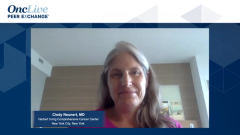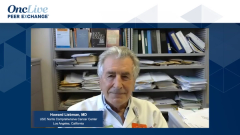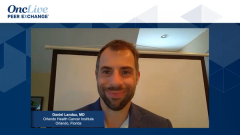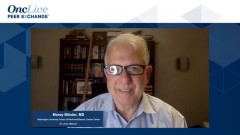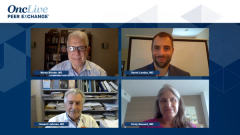
Novel Treatment Strategies in Immune Thrombocytopenia: Complement Inhibitors
Panelists review data behind sutimlimab, a complement inhibitor being investigated in the setting of immune thrombocytopenia.
Episodes in this series

Transcript:
Morey Blinder, MD: Let’s talk about just some of these other therapies. How about sutimlimab, which I think is available now for cold agglutinin disease, if I’m not mistaken as marketed as Enjaymo. Any thoughts about that as an ITP [immune thrombocytopenia] therapy, as a complement inhibitor?
Howard Liebman, MD: I think that the principle is like in patients who have cold agglutinin disease, we knew that you bind compliment because you have an IgM and you activate by the classical pathway, you have a lot of C3B, and they have a lot of extravascular hemolysis. It’s not intravascular and it’s being cleared by the C3B, and the same thing probably holds true to the platelet. So, the preliminary data in some of these mostly refractory cases by Catherine Broome, [MD, Georgetown University,] does suggest that there may be a role for that, but I think it’s still a minority of cases. I think it’s going to be less important than it will be maybe… or in the cold agglutinin disease where it’s been approved. I think there are other things coming along that might be potentially better, but I think that there’s a subset that would probably respond to that.
Morey Blinder, MD: Do you think the presence or absence of the spleen would make a difference with something like that?
Howard Liebman, MD: No, because with most of them, the compound receptors are rich in the liver. We knew for years that if you had a group of patients with [hemolytic anemia], you took out their spleen, they’d still have hemolysis, and it’s probably driven by the C3B on the cells. I don’t think it’s a matter of effect. I think it’s one aspect, but the spleen is good for basic antibody FC receptor clearance from antibodies.
Morey Blinder, MD: I was thinking that maybe this might be potentially more effective if the spleen was out and you were worried about more clearance in the liver say.
Howard Liebman, MD: Yeah. I think that was the best example that Catherine Broome had in her report of the case study that were reported in Blood.
Morey Blinder, MD: Danny, do you want to say anything about the compliment inhibitors and then I’ll ask Howard what his thoughts are on other effective therapies?
Daniel Landau, MD: Well, with the complement inhibitors, I do have experience with Enjaymo . I do have experience in the cold agglutinin world. There’s always the concern of vaccines and we must ensure that patients get certain vaccinations before they start the complement inhibition against encapsulated organisms. But this aside, I’ve found the tolerability to be quite excellent, at least in the cold agglutinin disease world. I don’t have any experience in ITP, but based on the favorable toxicity profile, hopefully, it’s going to work its way into the guidelines at some point.
Morey Blinder, MD: Yes. I think that’s fair. It seems to have some potential there and now it’s approved for something that may accelerate our use of it potentially.
Transcript edited for clarity.


